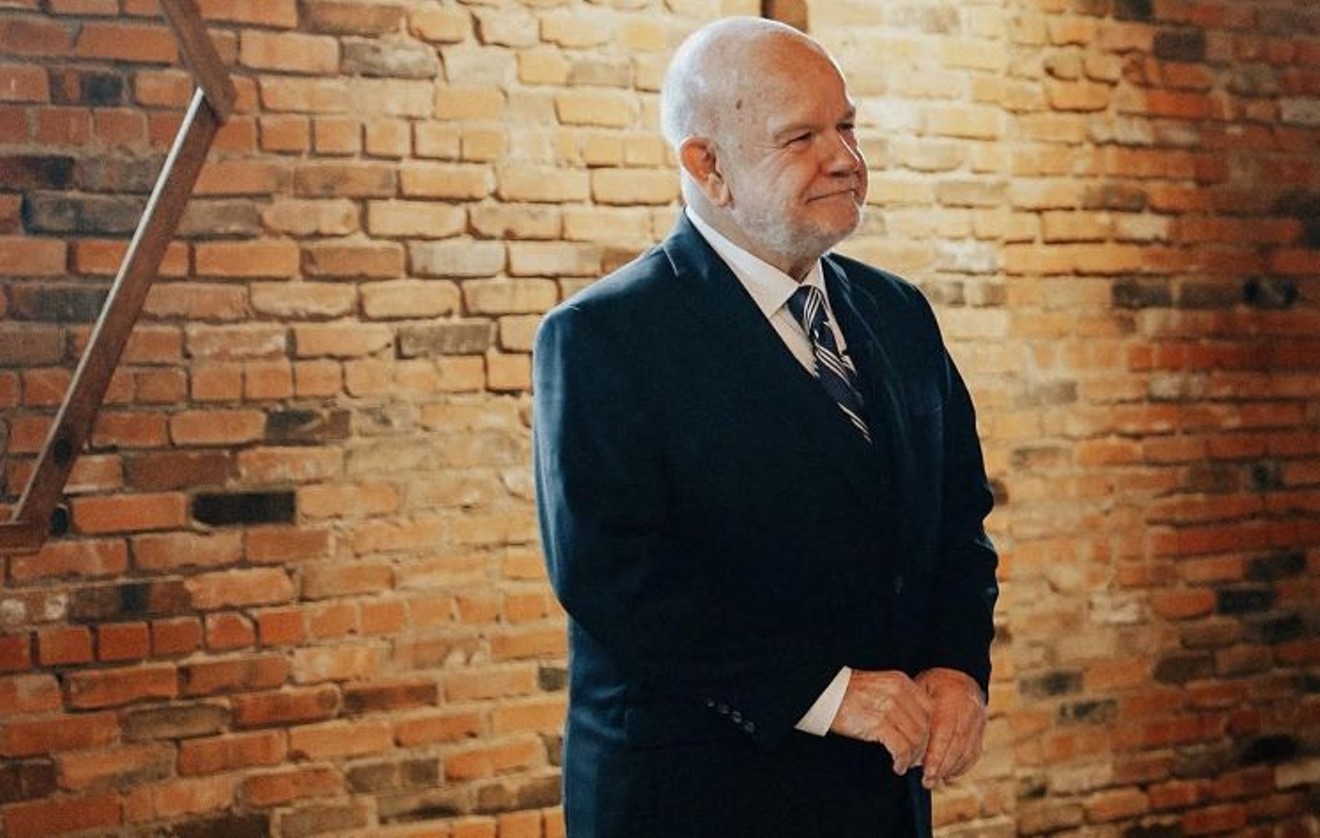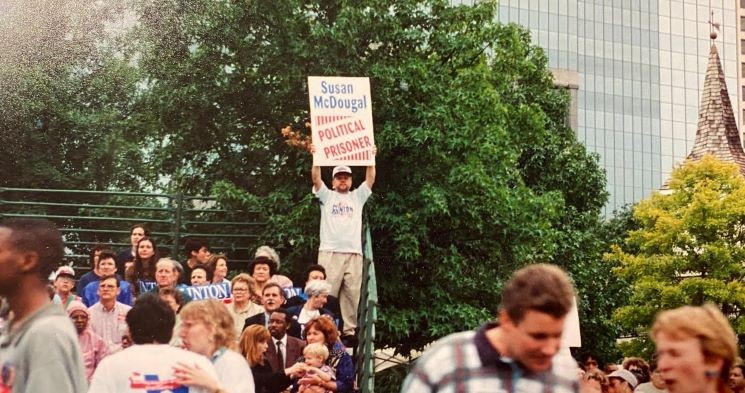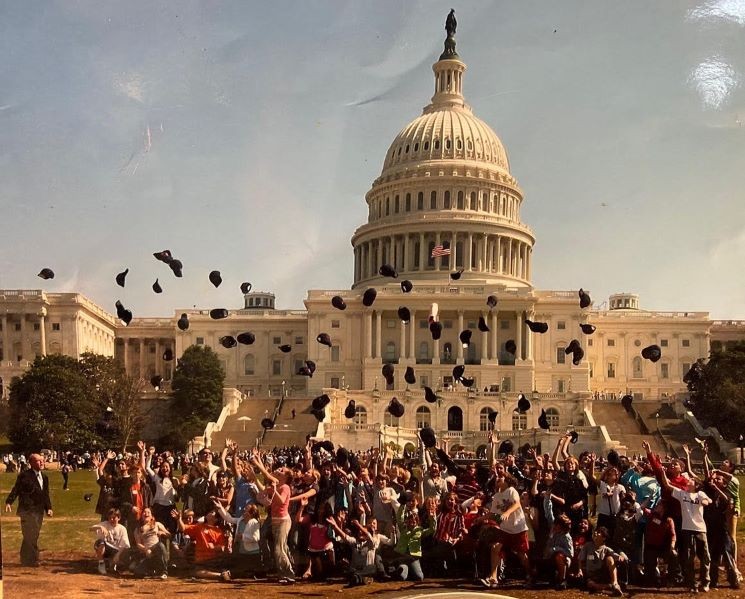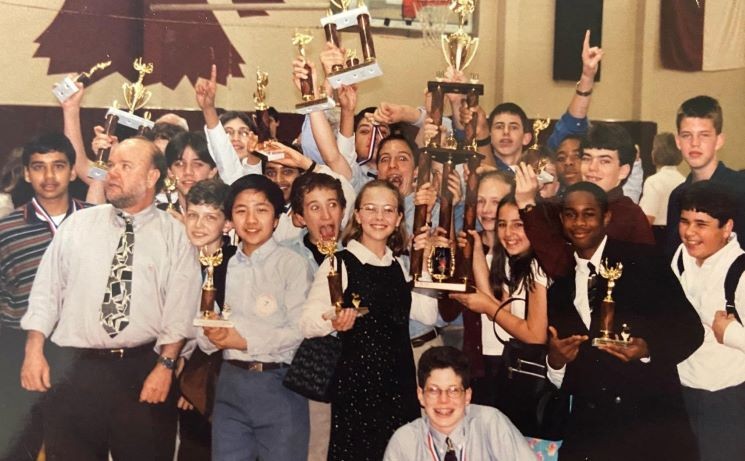I was at Pappas Seafood on the Gulf Freeway, eating lunch with Jim Henley, when I said something I’ll always regret.
Some in the Houston community will recall Jim as one of the Democrats who tried and failed to unseat Republican congressman John Culberson, before Lizzie Fletcher finally succeeded in 2018. At different times, he was also a Baptist preacher, a community organizer, a coffee farmer, and an elected trustee of the Harris County Board of Education. In between, he spent 20 years teaching at Lanier Middle School, first as a history teacher and then as the speech and debate coach.
I was on his debate team. His impossible energy, aggressive gesticulation, and spontaneous classroom antics inspired us to enormous success and made him a local legend. When he retired at the end of my seventh grade year, the team hadn’t lost a middle school tournament — including the annual national championship — for more than five years. We won because we had more exceptional competitors than most teams had members of any kind. Jim made that happen in a few ways: First, he recruited a huge and diverse group of students. Next, he pulled, pushed, and coaxed us out of our shells. Finally, he instilled in us a deep conviction that our middle school debate team mattered. The result was a culture that reliably turned pre-teens into skilled orators.
Jim died last month. He was 73, and it was a surprise. Coming out of the pandemic, we all expected that we’d get to see him again before too long. Instead, friends, colleagues, and students are now sharing passionate remembrances of the man amongst ourselves and on social media. Many attest that Jim permanently changed their lives. These are not new revelations. Thankfully, countless people told him that while he was still alive. A public memorial is being planned for later in the summer, to allow those scattered throughout the country to safely attend.
Which is why, along with many happier reflections, I’ve been thinking about that unfortunate remark I made to him back in 2017, and his response.
I’d recently finished my first year of law school out of state, and was home in Houston for a couple weeks before the fall semester began. We were talking about my career goals. I was telling him that I wouldn’t want to be a lawyer forever. In large part because of him, I wanted to teach one day. Still do. But I had too much of an ego to go straight into that profession. First I wanted to make my mark in the legal world, win high-profile cases, prove what I could accomplish, and all the rest. Then, later, I’d find my way into the classroom.
That was the vague plan I wanted to share with him. But that wasn’t how I put it. Instead, I said, “I think a lot about becoming a teacher; I just want to make my own impact first.”
Jim was not one to let you know that you’d hurt him. In that moment he couldn’t help it. His eyes betrayed him. His voice cracked a little as he softly replied, “You can make plenty of an impact as a teacher.”
No one will admit that they disagree with that. And yet too many of us don’t exactly believe it, either. We talk about the value of good teachers, but too often that’s all it is. If a personable college student at the top of their class told us they wanted to teach public school — not through Teach for America, but as their career — many of us might think, “They could do so much more.”
Jim’s life should make us wonder how much more a person could do.
From Post-War Munich to an Arkansas Church
Jim’s dad was an American G.I., a career soldier who fought in Europe and was stationed there after the war. His mom was from Belgium. They were living in Munich in 1947 when Jim was born, their second of seven children.Jim said that the historical circumstances of his birth were his reason for caring about politics from an early age. Nearly every time he mentioned being born in post-war Munich, he called it a “bombed-out city.” Those bombs were dropped on civilian areas, by the good guys. Most Americans born in 1947 who looked like him were too busy reaping the benefits of the post-war economic boom to ponder things like that. Not Jim.
From Munich, his dad’s career took their family to posts in Kansas and Georgia. When Jim was in sixth grade they finally settled down in Arkansas. There, in 1967, Jim became a minister at the First Baptist Church in Clarksville, population 4,000. He was 19.
Despite his talent for public speaking, you could be forgiven for thinking he wasn’t the ministerial type. Jim’s father was politically conservative and an authoritarian patriarch, par for the course in the rural south. Jim was a gay man and a lifelong progressive Democrat who, from a young age, reveled in arguing with his dad at the dinner table.
Much of his congregation was not the ideal audience for a combative liberal. Right after Jim started preaching, Martin Luther King and Bobby Kennedy were murdered in quick succession. Then anti-war protesters descended on Chicago for the Democratic National Convention, and the country watched police officers gas and beat them on national television. In the wake of those events, Arkansas gave its electoral votes not to the Republican Richard Nixon or the Democrat Hubert Humphrey, but to the vehement segregationist George Wallace.
Jim’s community didn’t know he was gay, of course. I doubt he directly addressed his political views from the pulpit, either. But he gave overtones. During the week, he took classes at what was then called the College of the Ozarks, a campus far more progressive than its surrounding community. He befriended those who came to town through Volunteers in Service to America (VISTA), a program of President Johnson’s “war on poverty” sometimes called the “domestic Peace Corps.” On Sundays, his sermons were animated by his concern for the unheard and the oppressed. A diverse group of friends and classmates started attending those sermons, prompting some of the older regulars to walk out.
But Jim never minded being disliked by some. If it was for a good reason, he seemed to enjoy it. He wasn’t quite a radical by temperament, but he’d always push the envelope. In southern Arkansas in the 1960s, inter-denominational marriages were frowned upon. Ministers wouldn’t perform them. Jim did.
Despite or because of all that, a critical mass of his congregation fell in love with him. He saw their pain. Politically, he wanted to address its root causes. In the meantime, he also wanted to comfort anyone within the sound of his voice. He got a chance every Sunday.
He carried on for six years before he told his church he was resigning to attend seminary in Fort Worth. The church amended that plan. Jim went off to seminary, but they simply named him an “associate pastor” and got a driver to shuttle him to Arkansas to preach many Sundays.
But that arrangement couldn’t last forever, and Jim didn’t move back to Clarksville when he graduated. Nationally, the Baptist church was moving yet further rightward. Meanwhile, approaching 30, Jim was contemplating his own identity, and how he wanted to express it. He came to see the idea of resuming his full-time role in Arkansas as inauthentic and untenable. As he later summed it up, “If they knew me as I was, they wouldn’t have loved me as they did.” Many of his congregants cried when he gave his final sermon, nine years after he’d given his first. It was painful to stop leading a group that loved him like that, but I don’t think he regretted it. It would become a habit.
He never got another preaching job. But for Jim it was always about the people more than the title. He found new ways to keep doing the same work.
Starting a Community Center for Gay Men in Fort Worth
In the seventies in Fort Worth, there was only one sort of quasi-public place where gay men could be honest about their identities: bars, relegated to industrial areas, where, as Jim told it, the collective mood was more ashamed than proud. He recalled that depression, alcoholism, and drug addiction were commonplace.So Jim started a community center where gay men of every circumstance could gather for mutual support. I don’t know how large it was, or where he got the money for it. He obviously was not independently wealthy. But he was certainly tireless. When he had a good enough idea, he just made it happen.
At the community center, Jim and others would give help and guidance to all comers. It began as a safe space (decades before that phrase entered the zeitgeist) where people could start to overcome the learned shame, and its many consequences, that had kept them from living full lives. Then the AIDS epidemic hit.
When those with the resources to combat a crisis do nothing, the burden to do something — anything — too often falls to whomever is left. The members of the community center helped each other within their means, but they were not healthcare professionals, and they did not have public support. Together they sought help and guidance from those who would give it. Eventually, some were among the early members of the now-famous Buyers Club in Dallas.
As best I can tell, Jim’s role in all of this was, as ever, to comfort the afflicted. “Many people died,” he would later recall, tersely and rather quietly. His face said that specific people were on his mind.
Jim could hold a hell of a grudge when he believed powerful people had violated the public trust. He never forgave Ronald Reagan for his apathy toward the many thousands who suffered and died from AIDS during his presidency. In 1984, Jim passed the upkeep of the community center to some of its other members and became a paid staffer for Walter Mondale’s campaign for the presidency, playing a small part in that historically unsuccessful effort. Reagan kept his job of course. During his tenure 90,000 people died from AIDS — an epidemic he scarcely acknowledged.
After the campaign Jim made his only significant foray into private business. He moved to Little Rock, where he worked with his sister and brother-in-law, Susan and Jim McDougal, at Madison Guaranty Savings and Loan. If the business ever did well while he was there, that didn’t stop it from ending poorly. Just a couple years later, it was consumed in the wake of the savings and loan crisis.
Jim thought about becoming a minister again, but decided against it. Many in the Protestant community, after all, were describing the AIDS epidemic as divine retribution. Meanwhile, some friends from the Fort Worth community center, now in Houston, invited him to consider moving there. He recalled that, for a time as a child, he’d wanted to teach history. He was about to turn 40, and figured there would be no better time to give it a shot. Lanier Middle School in Houston ISD hired him.
Lanier Middle School and Debate
He taught sixth graders. His years giving sermons had prepared him to hold their attention. He was boisterous and his lectures were enthralling, every day. He ranted, shouted, threw his hands in the air, and followed his students’ questions wherever they led. He had a plan for his class writ large, and it didn’t involve detailed plans for how to spend each day. He kept that up his whole career.I’ve long wondered how Jim — Mr. Henley as we knew him in the classroom — sustained that performance on bad days. And he did have bad days. For one, he always lived alone, which he described as both an intentional choice and a source of periodic loneliness. For another, it turned out Arkansas wasn’t done with him yet.
He’d already been teaching at Lanier for a little while when he was brought up on criminal charges relating to his past business dealings in Little Rock. I don’t know what the precise charges were, but in the aftermath of the savings and loan crisis investigators built cases against former business operators and employees across the state. But Jim maintained his innocence, then and always. He refused to plead, demanded a trial, and was found not guilty on all charges. His younger brother John recalls that, of hundreds of similar cases brought around that time, Jim’s was one of only a few that resulted in a full acquittal.
If that wasn’t enough, he soon became involved — tangentially — in the Whitewater affair. His sister Susan came under the spotlight of Independent Counsel Kenneth Starr, and then became one of the only people Starr managed to convict. The Independent Counsel tried to get Susan to testify against the Clintons in exchange for leniency in sentencing, and she refused. Starr called her to testify at a grand jury, where she remained silent and was held in contempt of court. Susan later said she feared she would be charged with perjury if she told the truth. President Clinton pardoned her on his final day in office.
Throughout, Jim publicly railed against Starr and his team for what he saw as a political crusade. While his sister served her sentence, Jim traveled from Houston to protest her imprisonment.
It’s hard to know what to make of all of that. A prosecution can be a politically motivated hit job and the defendant can still be guilty. But Jim passionately believed his sister was innocent. He also saw the Starr prosecutions — and the resulting impeachment effort — as a hypocritical perversion of justice. He later described the closing argument of the President’s impeachment defense, given by former U.S. Senator and Arkansas Governor Dale Bumpers, as one of the great speeches of our time.
None of these distractions made him worse at his job. As he criss-crossed state lines to fight these battles, he apparently never lost the full support of his administrators. Some of that had to do with how much his students loved him. I realize now that Lanier’s students were spoiled with many great teachers. Even with stiff competition, Mr. Henley stood out. He formed the Ecology Club, which attracted a large membership. Soon, he started an annual spring break trip to Washington D.C. for sixth graders.
I went on that trip once it had become something of an institution, more than a decade after it began. Nearly a hundred of my classmates went with me. It was led by Mr. Henley, one other teacher, and two or three parent chaperones who together were responsible for shepherding an enormous group of eleven and twelve year olds around the capital. Our group had its own appointments at the Capitol building, lawmakers’ offices, and Arlington National Cemetery, among others. That didn’t seem improbable then. With all the attendant logistics and risk, the whole operation seems like it would never get off the ground today. I asked him many years later how he made it happen. “I just started it,” he said.
That trip was his idea. But starting a speech and debate team wasn’t. The team had been briefly led by another teacher, under whom the team practiced and competed internally, but didn’t go to outside competitions. When that teacher left, the school asked Jim to take over. He saw an opportunity.
Jim thrived on inspiring people. He’d been teaching history for a decade by then, and his oldest students had graduated from college. Some were reaching out to tell him how much his class still meant to them. If he’d done that with students for whom he’d taught one class, just imagine what he could do if he taught the same kids for three years. And the class would be an elective, without a state-mandated curriculum or standardized tests. He jumped at the chance.
Jim had no prior experience with academic speech and debate contests. That turned out to be a good thing. The dominant form of competitive debate has long been an event called Policy Debate, sometimes called Cross-Examination Debate in Texas. Generations ago, it was a worthwhile intellectual exercise. But by 1997 it had devolved into what it remains today: an insular, shameless, and unpersuasive game of chess that allows its players to invent their own increasingly bizarre pieces. This manifests as two-person teams of children, wearing suits, incomprehensibly speed-reading pre-prepared arguments about why their opponents’ assigned position will inevitably lead to nuclear war. Always nuclear war. When Jim started coaching debate he visited a local tournament, where he saw students engaging in this odd ritual. It was never a question: his team would not compete on those terms.
Instead, he wanted to teach his students to communicate and persuade. He was thrilled to discover the speech events — particularly Original Oratory, where students gave speeches that they wrote ahead of time, and Extemporaneous Speaking, where they spoke on current events topics assigned only 30 minutes prior.
And he soon found that Policy Debate was not the only debate event available. In Lincoln-Douglas Debate, students quarreled over hefty philosophical issues, usually (in those days) while speaking at a reasonable pace. Public Forum Debate was introduced around that time with rules designed explicitly to discourage the absurdities of Policy and instead encourage measured, reasonable arguments designed for a lay audience. Other events included Declamation, where competitors memorized and presented historical speeches, and a bevy of dramatic events where students performed their own interpretations of stage plays, poetry, prose, and other material.
Winning a particular event sometimes meant adhering, at least somewhat, to unwritten norms that developed within the competitive community: wear conservative clothing, keep your arms by your sides unless you’re making an intentional gesture, walk left to right from the audience’s perspective between points, etc. Most coaches worked hard to instill those norms into their students, but Jim didn’t care much about them.
Instead, he saw the task of putting yourself out there — of speaking in public — as inherently virtuous. In his mind, the moment you made an argument or gave a performance you could be proud of, you’d already won. The fine-tuning could be done on your own terms, and with or without the debate community’s sometimes arbitrary restrictions. He decided that his job was to recruit students to compete and inspire them to do it with confidence.
Recruitment started by word of mouth: “Take Mr. Henley’s class, he’s crazy! In a good way, I promise.” Then parents saw their formerly shy kids give passionate speeches about issues that were important to them, and told other parents. Once the team started winning, Jim leaned into that success. In 2004 he somehow convinced the school (or perhaps a group of parents) to buy a billboard above Diedrich’s Coffee Shop, across the street from Lanier on Westheimer Boulevard, announcing that the team had just won back-to-back national championships.
He gave interviews with television stations and community newspapers. He even brought members of the team to nearby elementary schools to do brief showcases of the different events for fifth graders. I was in the audience for one. I hardly know how this was possible, but it killed in the room. Kids wanted to go to Lanier just to be on the debate team. Their parents were on board.
By the time I arrived at Lanier, about a quarter of the 450 students in my sixth grade class participated, to some extent or another, in the “debate club” that practiced after school on Tuesdays. In seventh grade, about 60 of us chose to take debate as an elective and compete regularly. The end result was that we’d bring more than a hundred seventh and eighth graders to an average tournament. They ranged from athletes and cheerleaders to kids who had apparently never projected their voices before — every variety of student that, at most schools, wouldn’t have been caught dead on a debate team.
Once we were on the team, Mr. Henley inspired us in ways big and small. Some stories get re-told often, like the time he made everyone scream at the top of their lungs, to get them comfortable projecting and embarrassing themselves. Or the time he burned the team’s ballots in the parking lot to remind his students who felt scorned by certain judges that those judges’ opinions didn’t matter.
Grand gestures aside, though, he inspired us on a daily basis. When we got a new topic for an upcoming tournament, he would not simply lay out the arguments on either side of the issue. And unlike some coaches, he certainly never wrote our arguments for us. Instead, he’d spark a barely structured and highly passionate class-wide debate on the topic. All of a sudden, we were invested in the subject matter. To prepare students for extemporaneous speaking, which focused on current events, he initiated far-ranging conversations on hot button issues of all kinds, and expected us to contribute. He affirmatively celebrated informed disagreement. At 12 years old, in 2006, I went to the Borders bookstore in Meyerland Plaza with my mom so I could buy the Iraq Study Group Report on the day it came out. Mr. Henley didn’t tell me to do that. His class just made me want to.
Winning was never the most important thing to Jim, but he would certainly leverage our desire to win tournaments to keep us engaged. Relatively early in his five-year winning streak, the team’s first real challenge came from a team composed of students from different schools in Aldine ISD. I wasn’t there yet, but I heard later about the team’s fear of losing to the “Aldine All-stars.” After Jim died, one student who was there recalled how he had warned them for weeks that the creation of the “All-star” team was a cynical ploy to make sure Lanier would finally lose a tournament, and how that had motivated them to prepare more than ever before. That student later learned that, behind the scenes, Jim had been involved in creating the “All-stars” in order to help schools in Aldine combine resources and get their speech and debate programs up and running. That it could also help motivate his students was just gravy.
While Jim’s energies were focused on the big picture, he mostly supervised as the team prepared for tournaments. His classroom was a “temporary” building by the football field — he proudly called it our “mobile home,” and the school clearly intended to use it indefinitely — and we had free reign over the area surrounding the building. We’d spread out in small groups to practice.
Mr. Henley popped in to give feedback here and there, but left the finer points of honing arguments and performances to the students themselves. This was intentional, and it proved to be a stroke of genius. Seventh and eighth grade students took ownership in the success of the team and coached one another. Together, we all coached the sixth graders in the debate club. High school students came back to coach regularly and led a training camp every summer before the national championship.
We invested that time and energy because Mr. Henley had successfully convinced us that the team was significant. And because we believed him, all of a sudden it was. Even more than how to speak and argue, Lanier Debate taught me that all important institutions have one shared and necessary component: people who believe that they are important. Our team carried an aura that inspired people to say things like, “Once a Lanier Debater, always a Lanier Debater,” and truly mean them. I have heard plenty of grown adults say — and have said, myself — “Yes, I’m a Lanier Debater,” in the present tense.
He could have stayed another decade or more. But that wasn’t his style. “My whole life, I’ve left things that I loved,” he’d tell me later. That may have been another stroke of genius. If anything ever relied on you for its existence, you didn’t build it — you were it. The culture he built of strong alumni involvement with the team persists to this day, and the team continues to attract large numbers of students under coach Franz Hill, whom I also count as a friend. Exploding interest in middle school debate locally and nationally makes it impossible for the team to be as dominant as it once was, but that was never the point. Jim was always thrilled to see the activity expanding in other schools. So, when he left the team, he may have thought he wasn’t needed anymore. Or maybe, after never staying in any role longer than a decade, he was just restless.
One Final Lesson
Before he retired, though, he plotted one final lesson for his students. Lanier was part of Texas’ seventh congressional district, represented at that time by John Culberson. Culberson was a Republican and a staunch supporter of the Iraq war. His platform typically tracked every trend in the Republican party, and he liked to focus on border and immigration enforcement in his public remarks. To curry favor with his affluent base voters in Memorial and West University, he used his federal office to oppose construction of additional light rail lines in Houston. His hold on the district was secure, as a simple matter of demographics, even heading into a 2006 election where the Democratic party would ultimately retake the House and Senate. Jim ran against him anyway, and announced that, win or lose, 2006 would be his last full calendar year at Lanier.Jim won a contested Democratic nomination and mounted a general election campaign on a shoestring budget. He was unable to attract national donations given his campaign’s impossible odds. But he had a large pool of volunteers composed largely of his students, both current and former, who stuffed envelopes, made phone calls, and knocked on doors.
The campaign adopted the slogan “Teacher for Congress” and bought a school bus. Jim was, unsurprisingly, a fiery campaigner. He was an avid champion of liberal causes, and perhaps even more aggressive in assailing his opponent’s judgment and policy positions. But Culberson’s judgment wasn’t entirely flawed: he was smart enough to refuse Jim’s proposal for a televised debate.
Jim was perhaps at his most passionate when reminding voters that Culberson had advocated “carpet bombing” Iraqi cities. That was Jim’s essentially correct shorthand for an ever-so-slightly more nuanced comment Culberson had made in a recent interview. Culberson specifically said that “the military ought to just take the gloves off,” and proposed that, in difficult areas, U.S. forces should order civilians to evacuate and then “send in the bombers.”
I never heard Jim invoke his own life experience while criticizing this point, but it was surely on his mind. His earliest memories were of Munich’s “bombed-out” remains. Mind you, he wasn’t a pacifist; he approved of the initial invasion of Afghanistan to fight Al Qaeda. But he was always opposed to the invasion of Iraq, and would always oppose the intentional destruction of civilian lives or livelihoods. Perhaps Jim saw that as the clearest contrast between him and his opponent.
It wasn’t a winning strategy. Culberson’s stump speeches on immigration, after all, presumed that his base didn’t sympathize with the plight of Latin-American migrants. I doubt they felt differently about Iraqi civilians. Jim lost, winning only 39 percent of the vote.
If you asked Jim later on, he’d tell you that the outcome had been inevitable. And he was right. Two years later, I dedicated hundreds of hours to volunteering for Michael Skelly, a wind energy executive who spent millions of dollars of his own money to run against Culberson. As Democrats looked to capitalize on President Bush’s historic unpopularity and win in unexpected places, Skelly even managed to court donations from outside the district. He was one of the best-funded challengers to a Republican incumbent in the country, running in a presidential election year in which Democrats would go on to win the White House, 257 House seats, and a supermajority in the Senate. To his credit, Skelly improved on Jim’s returns: he managed 42%.
Jim would tell you afterward that his decision to run was never about winning. I took that with a grain of salt. I’m not sure anyone can spend months talking about what they’ll do in office without believing, at least as they daydream, that it might come to pass. But I do believe he was at peace with the outcome, and his main point was well-taken: win or lose, the run was a lesson to his students.
The lesson was broader than “run for office.” He was telling us to take on battles worth fighting, no matter how uphill they might appear. He was telling us to never accept bad or amoral leadership as an inevitability. He was giving us a blueprint for how to build something worthwhile — momentum, or a community, if nothing else — out of a situation where others might see only futility.
After the election, Jim finished out the school year, won one final national championship, and said his emotional goodbyes. But they weren’t really goodbyes.
In retirement, Jim bought a coffee farm in Costa Rica, spent much of his time there for a few years, and sold the fruits of his harvests. He ran for a trustee position on the Harris County Board of Education, a body that mostly oversees “alternative” schools to which students are sent as a disciplinary measure. He won, and spent his time on the board quarreling with its Republican majority. He didn’t often advertise the fact that he held that position. He was just doing a job he thought someone ought to do.
In his free time, though, he remained a teacher and mentor to his students. He encouraged us often, and celebrated and shared our accomplishments on social media. When students published creative work of various kinds, he thoughtfully absorbed it — he had a way of seeing you in the way you hoped to be seen. He eventually sold the farm and moved back to Houston full-time. He volunteered for local political campaigns and eventually became an ardent supporter of Beto O’Rourke, whose slightly less sharp-tongued temperament nonetheless resembled his own. He visited family in Arkansas and traveled further afield. He went to Greece, where he spent many weeks volunteering to help refugees. He hosted gatherings at his home, and frequently met students, friends, and his old colleagues from Lanier for lunches. It’s not an exaggeration to say he never stopped fighting for what he believed in or bringing joy to our lives.
I didn’t talk to him enough in the last year, though. My habit of seeing him in person once or twice a year was interrupted by the pandemic, which kept me from coming back home for longer than ever before. My last gesture to him was sending him a holiday card. I regret not calling after that. I miss him terribly. I take solace in the fact that I told him what he meant to me many times during his life, and that countless others did the same.
For a man who lived alone, but was fond of visiting with friends and students, his last year was a dramatic change of pace. He took the pandemic seriously. He did not want to become infected or infect others, so his human contact was extremely limited. He got vaccinated as soon as he could. He finally was able to visit Arkansas in the weeks before he died.
I don’t think Jim had too many regrets, at least compared to most of us. He only shared one with me: he didn’t think he’d done enough to show the team members who didn’t win a lot of trophies just how proud he was of them. He knew he’d always said the right things, and that so many credited him with inspiring them and building their confidence during those formative years. It wasn’t uncommon for someone he hadn’t seen in over a decade to come out of the woodwork, just to tell Jim that he was one of their most influential teachers. Still, Jim noticed that the students who were popular with debate tournament judges in middle school were the ones who reached out to him most often later in their lives. He regretted that disparity.
Perhaps he was right to feel that way, but in many ways Jim’s life was its own testament to the profound virtue of excellence in defeat. Jim was whip-smart, but didn’t attend prestigious schools. He didn’t win awards, fame, or riches as a pastor in a small town. Founding a community center was a thankless struggle in the shadows of society. His first foray into the business world got him indicted, and he certainly didn’t get rich selling coffee. He was an excellent teacher, but few outside of the walls of his classroom cared during the ten years before he started coaching an activity that gave its winners those damn plastic trophies. He lost his race for Congress by 20 points. For his short time as an elected official, he was in the minority on an obscure county board. As a Democrat in Arkansas and Texas, the candidates he worked for and supported lost more often than they won.
And yet I know no one personally who’s made a greater impact on the world. In all of his roles, Jim uplifted those around him. He made us want to be better versions of ourselves. He told us — and better yet, he showed us — that what we were doing mattered. He reserved his ire for those who failed to use their power for good, and he conveyed it as unsparingly as he showered his love on just about everyone else.
That’s why the remark I made that day, years ago, still hurts. Not because I didn’t apologize; I did. Not because we didn’t make amends; we did, almost immediately, and two years later he officiated my wedding. It hurts because it revealed my subconscious belief in a broken ideology — one embodied in the bullshit joke that “those who can’t do, teach” — even though that ideology runs counter to everything Jim stood for. Even though it ran counter to everything his life had already shown to be true.
I thought that to make an impact you had to win something, make something, or run something. But in the end, all of that only matters if your contribution helped someone live a better life than they would have without you. Jim Henley cut out the middle man. For so, so many of us, all his life, he was the help we needed.
Reid Hopkins works as an attorney in Quantico, Virginia. He spends his free time making folk music.









